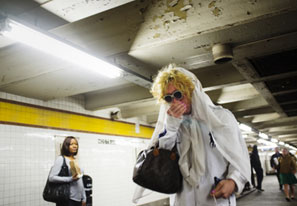
It was after midnight on a Thursday in May when Lixence Exavier decided to relieve himself on a Brooklyn subway platform. Unfortunately for the 28-year-old Exavier, NYPD officer Jacobo Rosario was watching. In accordance with New York City law—and the lessons learned from two-plus decades of proactive policing—Rosario moved in to make an arrest. While patting the suspect down, the officer discovered the .45 caliber Smith and Wesson M&P handgun that Exavier had tucked into his waistband and the nine hollow-point bullets he’d stashed in his pockets.
Exavier’s arrest was a textbook example of Broken Windows policing, which cracks down on low-level offenses—loitering, subway fare-jumping, and public urination, for example—not only to improve quality of life but also because offenders often turn out, as Exavier did, to be involved in more serious criminal behavior. If Melissa Mark-Viverito has her way, however, such arrests will soon be a thing of the past. The progressive speaker of New York’s city council has introduced a bill to decriminalize a slew of quality-of-life offenses, including public urination. Under Mark-Viverito’s plan, Officer Rosario’s pat-down of Lixence Exavier would never have happened. Cops who caught someone urinating on a subway platform would only write him a ticket and send him on his way.
Thankfully, numerous New Yorkers with longer memories than Mark-Viverito’s have risen up in opposition to her plan—notably, NYPD commissioner William J. Bratton, who pioneered quality-of-life policing during his first stint as New York’s top cop, under Mayor Rudolph Giuliani. Even Public Advocate Letitia James and City Comptroller Scott Stringer—both Democrats and both allies of New York’s left-wing mayor Bill de Blasio—are skeptical about decriminalizing public urination. “[H]aving grown up in this city in the 70s and 80s, I am not in favor of people urinating in the street, jumping turnstiles, or creating dangerous situations by being drunk,” Stringer said recently.
Mark-Viverito’s proposed leniency contrasts with the attitudes of other cities getting more aggressive in combating public urination. In San Francisco, where a urine-corroded lamppost recently collapsed onto a car, health officials have experimented with a special urine-repellent, super-hydrophobic paint that causes liquid to splash back at its source. Paris deploys an 88-member “Bad Behavior Brigade” to combat the scourge of what the French call urine sauvage. In one British suburb, authorities now offer those caught urinating in public the chance to avoid a fine by cleaning up the mess themselves.
Urine is sterile and nontoxic, and so generally not a public-health hazard (falling streetlamps notwithstanding). But its unmistakable odor, wafted along on hot waves of summer city air, has a tendency to linger in alleys and on stoops, in the stairwells and lobbies of apartment buildings—and in the minds of those who remember a time when New York was a city in decline. The smell of urine is the olfactory equivalent of the sight of litter in the street, graffiti on the subway, or a building with broken windows. All send the same message: no one cares about public spaces in this city, so do as you please.
